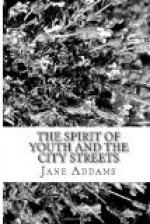Is it only the artists who really see these young creatures as they are—the artists who are themselves endowed with immortal youth? Is it our disregard of the artist’s message which makes us so blind and so stupid, or are we so under the influence of our Zeitgeist that we can detect only commercial values in the young as well as in the old? It is as if our eyes were holden to the mystic beauty, the redemptive joy, the civic pride which these multitudes of young people might supply to our dingy towns.
The young creatures themselves piteously look all about them in order to find an adequate means of expression for their most precious message: One day a serious young man came to Hull-House with his pretty young sister who, he explained, wanted to go somewhere every single evening, “although she could only give the flimsy excuse that the flat was too little and too stuffy to stay in.” In the difficult role of elder brother, he had done his best, stating that he had taken her “to all the missions in the neighborhood, that she had had a chance to listen to some awful good sermons and to some elegant hymns, but that some way she did not seem to care for the society of the best Christian people.” The little sister reddened painfully under this cruel indictment and could offer no word of excuse, but a curious thing happened to me. Perhaps it was the phrase “the best Christian people,” perhaps it was the delicate color of her flushing cheeks and her swimming eyes, but certain it is, that instantly and vividly there appeared to my mind the delicately tinted piece of wall in a Roman catacomb where the early Christians, through a dozen devices of spring flowers, skipping lambs and a shepherd tenderly guiding the young, had indelibly written down that the Christian message is one of inexpressible joy. Who is responsible for forgetting this message delivered by the “best Christian people” two thousand years ago? Who is to blame that the lambs, the little ewe lambs, have been so caught upon the brambles?
But quite as the modern city wastes this most valuable moment in the life of the girl, and drives into all sorts of absurd and obscure expressions her love and yearning towards the world in which she forecasts her destiny, so it often drives the boy into gambling and drinking in order to find his adventure.
Of Lincoln’s enlistment of two and a half million soldiers, a very large number were under twenty-one, some of them under eighteen, and still others were mere children under fifteen. Even in those stirring times when patriotism and high resolve were at the flood, no one responded as did “the boys,” and the great soul who yearned over them, who refused to shoot the sentinels who slept the sleep of childhood, knew, as no one else knew, the precious glowing stuff of which his army was made. But what of the millions of boys who are now searching for adventurous action, longing to fulfil the same high purpose?




